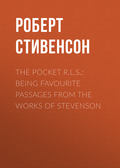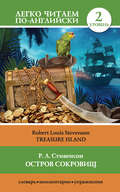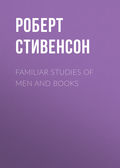
Роберт Льюис Стивенсон
Memoir of Fleeming Jenkin
‘The Revolution,’ writes Fleeming to Frank Scott, ‘was quite delightful: getting popped at and run at by horses, and giving sous for the wounded into little boxes guarded by the raggedest, picturesquest, delightfullest, sentinels; but the insurrection! ugh, I shudder to think at [sic] it.’ He found it ‘not a bit of fun sitting boxed up in the house four days almost.. I was the only gentleman to four ladies, and didn’t they keep me in order! I did not dare to show my face at a window, for fear of catching a stray ball or being forced to enter the National Guard; [for] they would have it I was a man full-grown, French, and every way fit to fight. And my mamma was as bad as any of them; she that told me I was a coward last time if I stayed in the house a quarter of an hour! But I drew, examined the pistols, of which I found lots with caps, powder, and ball, while sometimes murderous intentions of killing a dozen insurgents and dying violently overpowered by numbers…’ We may drop this sentence here: under the conduct of its boyish writer, it was to reach no legitimate end.
Four days of such a discipline had cured the family of Paris; the same year Fleeming was to write, in answer apparently to a question of Frank Scott’s, ‘I could find no national game in France but revolutions’; and the witticism was justified in their experience. On the first possible day, they applied for passports, and were advised to take the road to Geneva. It appears it was scarce safe to leave Paris for England. Charles Reade, with keen dramatic gusto, had just smuggled himself out of that city in the bottom of a cab. English gold had been found on the insurgents, the name of England was in evil odour; and it was thus – for strategic reasons, so to speak – that Fleeming found himself on the way to that Italy where he was to complete his education, and for which he cherished to the end a special kindness.
It was in Genoa they settled; partly for the sake of the captain, who might there find naval comrades; partly because of the Ruffinis, who had been friends of Mrs. Jenkin in their time of exile and were now considerable men at home; partly, in fine, with hopes that Fleeming might attend the University; in preparation for which he was put at once to school. It was the year of Novara; Mazzini was in Rome; the dry bones of Italy were moving; and for people of alert and liberal sympathies the time was inspiriting. What with exiles turned Ministers of State, universities thrown open to Protestants, Fleeming himself the first Protestant student in Genoa, and thus, as his mother writes, ‘a living instance of the progress of liberal ideas’ – it was little wonder if the enthusiastic young woman and the clever boy were heart and soul upon the side of Italy. It should not be forgotten that they were both on their first visit to that country; the mother still child enough ‘to be delighted when she saw real monks’; and both mother and son thrilling with the first sight of snowy Alps, the blue Mediterranean, and the crowded port and the palaces of Genoa. Nor was their zeal without knowledge. Ruffini, deputy for Genoa and soon to be head of the University, was at their side; and by means of him the family appear to have had access to much Italian society. To the end, Fleeming professed his admiration of the Piedmontese and his unalterable confidence in the future of Italy under their conduct; for Victor Emanuel, Cavour, the first La Marmora and Garibaldi, he had varying degrees of sympathy and praise: perhaps highest for the King, whose good sense and temper filled him with respect – perhaps least for Garibaldi, whom he loved but yet mistrusted.
But this is to look forward: these were the days not of Victor Emanuel but of Charles Albert; and it was on Charles Albert that mother and son had now fixed their eyes as on the sword-bearer of Italy. On Fleeming’s sixteenth birthday, they were, the mother writes, ‘in great anxiety for news from the army. You can have no idea what it is to live in a country where such a struggle is going on. The interest is one that absorbs all others. We eat, drink, and sleep to the noise of drums and musketry. You would enjoy and almost admire Fleeming’s enthusiasm and earnestness – and, courage, I may say – for we are among the small minority of English who side with the Italians. The other day, at dinner at the Consul’s, boy as he is, and in spite of my admonitions, Fleeming defended the Italian cause, and so well that he “tripped up the heels of his adversary” simply from being well-informed on the subject and honest. He is as true as steel, and for no one will he bend right or left… Do not fancy him a Bobadil,’ she adds, ‘he is only a very true, candid boy. I am so glad he remains in all respects but information a great child.’
If this letter is correctly dated, the cause was already lost and the King had already abdicated when these lines were written. No sooner did the news reach Genoa, than there began ‘tumultuous movements’; and the Jenkins’ received hints it would be wise to leave the city. But they had friends and interests; even the captain had English officers to keep him company, for Lord Hardwicke’s ship, the Vengeance, lay in port; and supposing the danger to be real, I cannot but suspect the whole family of a divided purpose, prudence being possibly weaker than curiosity. Stay, at least, they did, and thus rounded their experience of the revolutionary year. On Sunday, April 1, Fleeming and the captain went for a ramble beyond the walls, leaving Aunt Anna and Mrs. Jenkin to walk on the bastions with some friends. On the way back, this party turned aside to rest in the Church of the Madonna delle Grazie. ‘We had remarked,’ writes Mrs. Jenkin, ‘the entire absence of sentinels on the ramparts, and how the cannons were left in solitary state; and I had just remarked “How quiet everything is!” when suddenly we heard the drums begin to beat and distant shouts. Accustomed as we are to revolutions, we never thought of being frightened.’ For all that, they resumed their return home. On the way they saw men running and vociferating, but nothing to indicate a general disturbance, until, near the Duke’s palace, they came upon and passed a shouting mob dragging along with it three cannon. It had scarcely passed before they heard ‘a rushing sound’; one of the gentlemen thrust back the party of ladies under a shed, and the mob passed again. A fine-looking young man was in their hands; and Mrs. Jenkin saw him with his mouth open as if he sought to speak, saw him tossed from one to another like a ball, and then saw him no more. ‘He was dead a few instants after, but the crowd hid that terror from us. My knees shook under me and my sight left me.’ With this street tragedy, the curtain rose upon their second revolution.
The attack on Spirito Santo, and the capitulation and departure of the troops speedily followed. Genoa was in the hands of the Republicans, and now came a time when the English residents were in a position to pay some return for hospitality received. Nor were they backward. Our Consul (the same who had the benefit of correction from Fleeming) carried the Intendente on board the Vengeance, escorting him through the streets, getting along with him on board a shore boat, and when the insurgents levelled their muskets, standing up and naming himself, ‘Console Inglese.’ A friend of the Jenkins’, Captain Glynne, had a more painful, if a less dramatic part. One Colonel Nosozzo had been killed (I read) while trying to prevent his own artillery from firing on the mob; but in that hell’s cauldron of a distracted city, there were no distinctions made, and the Colonel’s widow was hunted for her life. In her grief and peril, the Glynnes received and hid her; Captain Glynne sought and found her husband’s body among the slain, saved it for two days, brought the widow a lock of the dead man’s hair; but at last, the mob still strictly searching, seems to have abandoned the body, and conveyed his guest on board the Vengeance. The Jenkins also had their refugees, the family of an employé threatened by a decree. ‘You should have seen me making a Union Jack to nail over our door,’ writes Mrs. Jenkin. ‘I never worked so fast in my life. Monday and Tuesday,’ she continues, ‘were tolerably quiet, our hearts beating fast in the hope of La Marmora’s approach, the streets barricaded, and none but foreigners and women allowed to leave the city.’ On Wednesday, La Marmora came indeed, but in the ugly form of a bombardment; and that evening the Jenkins sat without lights about their drawing-room window, ‘watching the huge red flashes of the cannon’ from the Brigato and La Specula forts, and hearkening, not without some awful pleasure, to the thunder of the cannonade.
Lord Hardwicke intervened between the rebels and La Marmora; and there followed a troubled armistice, filled with the voice of panic. Now the Vengeance was known to be cleared for action; now it was rumoured that the galley slaves were to be let loose upon the town, and now that the troops would enter it by storm. Crowds, trusting in the Union Jack over the Jenkins’ door, came to beg them to receive their linen and other valuables; nor could their instances be refused; and in the midst of all this bustle and alarm, piles of goods must be examined and long inventories made. At last the captain decided things had gone too far. He himself apparently remained to watch over the linen; but at five o’clock on the Sunday morning, Aunt Anna, Fleeming, and his mother were rowed in a pour of rain on board an English merchantman, to suffer ‘nine mortal hours of agonising suspense.’ With the end of that time, peace was restored. On Tuesday morning officers with white flags appeared on the bastions; then, regiment by regiment, the troops marched in, two hundred men sleeping on the ground floor of the Jenkins’ house, thirty thousand in all entering the city, but without disturbance, old La Marmora being a commander of a Roman sternness.
With the return of quiet, and the reopening of the universities, we behold a new character, Signor Flaminio: the professors, it appears, made no attempt upon the Jenkin; and thus readily italianised the Fleeming. He came well recommended; for their friend Ruffini was then, or soon after, raised to be the head of the University; and the professors were very kind and attentive, possibly to Ruffini’s protégé, perhaps also to the first Protestant student. It was no joke for Signor Flaminio at first; certificates had to be got from Paris and from Rector Williams; the classics must be furbished up at home that he might follow Latin lectures; examinations bristled in the path, the entrance examination with Latin and English essay, and oral trials (much softened for the foreigner) in Horace, Tacitus, and Cicero, and the first University examination only three months later, in Italian eloquence, no less, and other wider subjects. On one point the first Protestant student was moved to thank his stars: that there was no Greek required for the degree. Little did he think, as he set down his gratitude, how much, in later life and among cribs and dictionaries, he was to lament this circumstance; nor how much of that later life he was to spend acquiring, with infinite toil, a shadow of what he might then have got with ease and fully. But if his Genoese education was in this particular imperfect, he was fortunate in the branches that more immediately touched on his career. The physical laboratory was the best mounted in Italy. Bancalari, the professor of natural philosophy, was famous in his day; by what seems even an odd coincidence, he went deeply into electromagnetism; and it was principally in that subject that Signor Flaminio, questioned in Latin and answering in Italian, passed his Master of Arts degree with first-class honours. That he had secured the notice of his teachers, one circumstance sufficiently proves. A philosophical society was started under the presidency of Mamiani, ‘one of the examiners and one of the leaders of the Moderate party’; and out of five promising students brought forward by the professors to attend the sittings and present essays, Signor Flaminio was one. I cannot find that he ever read an essay; and indeed I think his hands were otherwise too full. He found his fellow-students ‘not such a bad set of chaps,’ and preferred the Piedmontese before the Genoese; but I suspect he mixed not very freely with either. Not only were his days filled with university work, but his spare hours were fully dedicated to the arts under the eye of a beloved task-mistress. He worked hard and well in the art school, where he obtained a silver medal ‘for a couple of legs the size of life drawn from one of Raphael’s cartoons.’ His holidays were spent in sketching; his evenings, when they were free, at the theatre. Here at the opera he discovered besides a taste for a new art, the art of music; and it was, he wrote, ‘as if he had found out a heaven on earth.’ ‘I am so anxious that whatever he professes to know, he should really perfectly possess,’ his mother wrote, ‘that I spare no pains’; neither to him nor to myself, she might have added. And so when he begged to be allowed to learn the piano, she started him with characteristic barbarity on the scales; and heard in consequence ‘heart-rending groans’ and saw ‘anguished claspings of hands’ as he lost his way among their arid intricacies.
In this picture of the lad at the piano, there is something, for the period, girlish. He was indeed his mother’s boy; and it was fortunate his mother was not altogether feminine. She gave her son a womanly delicacy in morals, to a man’s taste – to his own taste in later life – too finely spun, and perhaps more elegant than healthful. She encouraged him besides in drawing-room interests. But in other points her influence was manlike. Filled with the spirit of thoroughness, she taught him to make of the least of these accomplishments a virile task; and the teaching lasted him through life. Immersed as she was in the day’s movements and buzzed about by leading Liberals, she handed on to him her creed in politics: an enduring kindness for Italy, and a loyalty, like that of many clever women, to the Liberal party with but small regard to men or measures. This attitude of mind used often to disappoint me in a man so fond of logic; but I see now how it was learned from the bright eyes of his mother and to the sound of the cannonades of 1848. To some of her defects, besides, she made him heir. Kind as was the bond that united her to her son, kind and even pretty, she was scarce a woman to adorn a home; loving as she did to shine; careless as she was of domestic, studious of public graces. She probably rejoiced to see the boy grow up in somewhat of the image of herself, generous, excessive, enthusiastic, external; catching at ideas, brandishing them when caught; fiery for the right, but always fiery; ready at fifteen to correct a consul, ready at fifty to explain to any artist his own art.
The defects and advantages of such a training were obvious in Fleeming throughout life. His thoroughness was not that of the patient scholar, but of an untrained woman with fits of passionate study; he had learned too much from dogma, given indeed by cherished lips; and precocious as he was in the use of the tools of the mind, he was truly backward in knowledge of life and of himself. Such as it was at least, his home and school training was now complete; and you are to conceive the lad as being formed in a household of meagre revenue, among foreign surroundings, and under the influence of an imperious drawing-room queen; from whom he learned a great refinement of morals, a strong sense of duty, much forwardness of bearing, all manner of studious and artistic interests, and many ready-made opinions which he embraced with a son’s and a disciple’s loyalty.
CHAPTER III. 1851–1858
Return to England – Fleeming at Fairbairn’s – Experience in a Strike – Dr. Bell and Greek Architecture – The Gaskells – Fleeming at Greenwich – The Austins – Fleeming and the Austins – His Engagement – Fleeming and Sir W. Thomson.
In 1851, the year of Aunt Anna’s death, the family left Genoa and came to Manchester, where Fleeming was entered in Fairbairn’s works as an apprentice. From the palaces and Alps, the Mole, the blue Mediterranean, the humming lanes and the bright theatres of Genoa, he fell – and he was sharply conscious of the fall – to the dim skies and the foul ways of Manchester. England he found on his return ‘a horrid place,’ and there is no doubt the family found it a dear one. The story of the Jenkin finances is not easy to follow. The family, I am told, did not practice frugality, only lamented that it should be needful; and Mrs. Jenkin, who was always complaining of ‘those dreadful bills,’ was ‘always a good deal dressed.’ But at this time of the return to England, things must have gone further. A holiday tour of a fortnight, Fleeming feared would be beyond what he could afford, and he only projected it ‘to have a castle in the air.’ And there were actual pinches. Fresh from a warmer sun, he was obliged to go without a greatcoat, and learned on railway journeys to supply the place of one with wrappings of old newspaper.
From half-past eight till six, he must ‘file and chip vigorously in a moleskin suit and infernally dirty.’ The work was not new to him, for he had already passed some time in a Genoese shop; and to Fleeming no work was without interest. Whatever a man can do or know, he longed to know and do also. ‘I never learned anything,’ he wrote, ‘not even standing on my head, but I found a use for it.’ In the spare hours of his first telegraph voyage, to give an instance of his greed of knowledge, he meant ‘to learn the whole art of navigation, every rope in the ship and how to handle her on any occasion’; and once when he was shown a young lady’s holiday collection of seaweeds, he must cry out, ‘It showed me my eyes had been idle.’ Nor was his the case of the mere literary smatterer, content if he but learn the names of things. In him, to do and to do well, was even a dearer ambition than to know. Anything done well, any craft, despatch, or finish, delighted and inspired him. I remember him with a twopenny Japanese box of three drawers, so exactly fitted that, when one was driven home, the others started from their places; the whole spirit of Japan, he told me, was pictured in that box; that plain piece of carpentry was as much inspired by the spirit of perfection as the happiest drawing or the finest bronze; and he who could not enjoy it in the one was not fully able to enjoy it in the others. Thus, too, he found in Leonardo’s engineering and anatomical drawings a perpetual feast; and of the former he spoke even with emotion. Nothing indeed annoyed Fleeming more than the attempt to separate the fine arts from the arts of handicraft; any definition or theory that failed to bring these two together, according to him, had missed the point; and the essence of the pleasure received lay in seeing things well done. Other qualities must be added; he was the last to deny that; but this, of perfect craft, was at the bottom of all. And on the other hand, a nail ill-driven, a joint ill-fitted, a tracing clumsily done, anything to which a man had set his hand and not set it aptly, moved him to shame and anger. With such a character, he would feel but little drudgery at Fairbairn’s. There would be something daily to be done, slovenliness to be avoided, and a higher mark of skill to be attained; he would chip and file, as he had practiced scales, impatient of his own imperfection, but resolute to learn.
And there was another spring of delight. For he was now moving daily among those strange creations of man’s brain, to some so abhorrent, to him of an interest so inexhaustible: in which iron, water, and fire are made to serve as slaves, now with a tread more powerful than an elephant’s, and now with a touch more precise and dainty than a pianist’s. The taste for machinery was one that I could never share with him, and he had a certain bitter pity for my weakness. Once when I had proved, for the hundredth time, the depth of this defect, he looked at me askance. ‘And the best of the joke,’ said he, ‘is that he thinks himself quite a poet.’ For to him the struggle of the engineer against brute forces and with inert allies, was nobly poetic. Habit never dulled in him the sense of the greatness of the aims and obstacles of his profession. Habit only sharpened his inventor’s gusto in contrivance, in triumphant artifice, in the Odyssean subtleties, by which wires are taught to speak, and iron hands to weave, and the slender ship to brave and to outstrip the tempest. To the ignorant the great results alone are admirable; to the knowing, and to Fleeming in particular, rather the infinite device and sleight of hand that made them possible.
A notion was current at the time that, in such a shop as Fairbairn’s, a pupil would never be popular unless he drank with the workmen and imitated them in speech and manner. Fleeming, who would do none of these things, they accepted as a friend and companion; and this was the subject of remark in Manchester, where some memory of it lingers till to-day. He thought it one of the advantages of his profession to be brought into a close relation with the working classes; and for the skilled artisan he had a great esteem, liking his company, his virtues, and his taste in some of the arts. But he knew the classes too well to regard them, like a platform speaker, in a lump. He drew, on the other hand, broad distinctions; and it was his profound sense of the difference between one working man and another that led him to devote so much time, in later days, to the furtherance of technical education. In 1852 he had occasion to see both men and masters at their worst, in the excitement of a strike; and very foolishly (after their custom) both would seem to have behaved. Beginning with a fair show of justice on either side, the masters stultified their cause by obstinate impolicy, and the men disgraced their order by acts of outrage. ‘On Wednesday last,’ writes Fleeming, ‘about three thousand banded round Fairbairn’s door at 6 o’clock: men, women, and children, factory boys and girls, the lowest of the low in a very low place. Orders came that no one was to leave the works; but the men inside (Knobsticks, as they are called) were precious hungry and thought they would venture. Two of my companions and myself went out with the very first, and had the full benefit of every possible groan and bad language.’ But the police cleared a lane through the crowd, the pupils were suffered to escape unhurt, and only the Knobsticks followed home and kicked with clogs; so that Fleeming enjoyed, as we may say, for nothing, that fine thrill of expectant valour with which he had sallied forth into the mob. ‘I never before felt myself so decidedly somebody, instead of nobody,’ he wrote.
Outside as inside the works, he was ‘pretty merry and well to do,’ zealous in study, welcome to many friends, unwearied in loving-kindness to his mother. For some time he spent three nights a week with Dr. Bell, ‘working away at certain geometrical methods of getting the Greek architectural proportions’: a business after Fleeming’s heart, for he was never so pleased as when he could marry his two devotions, art and science. This was besides, in all likelihood, the beginning of that love and intimate appreciation of things Greek, from the least to the greatest, from the Agamemnon (perhaps his favourite tragedy) down to the details of Grecian tailoring, which he used to express in his familiar phrase: ‘The Greeks were the boys.’ Dr. Bell – the son of George Joseph, the nephew of Sir Charles, and though he made less use of it than some, a sharer in the distinguished talents of his race – had hit upon the singular fact that certain geometrical intersections gave the proportions of the Doric order. Fleeming, under Dr. Bell’s direction, applied the same method to the other orders, and again found the proportions accurately given. Numbers of diagrams were prepared; but the discovery was never given to the world, perhaps because of the dissensions that arose between the authors. For Dr. Bell believed that ‘these intersections were in some way connected with, or symbolical of, the antagonistic forces at work’; but his pupil and helper, with characteristic trenchancy, brushed aside this mysticism, and interpreted the discovery as ‘a geometrical method of dividing the spaces or (as might be said) of setting out the work, purely empirical and in no way connected with any laws of either force or beauty.’ ‘Many a hard and pleasant fight we had over it,’ wrote Jenkin, in later years; ‘and impertinent as it may seem, the pupil is still unconvinced by the arguments of the master.’ I do not know about the antagonistic forces in the Doric order; in Fleeming they were plain enough; and the Bobadil of these affairs with Dr. Bell was still, like the corrector of Italian consuls, ‘a great child in everything but information.’ At the house of Colonel Cleather, he might be seen with a family of children; and with these, there was no word of the Greek orders; with these Fleeming was only an uproarious boy and an entertaining draughtsman; so that his coming was the signal for the young people to troop into the playroom, where sometimes the roof rang with romping, and sometimes they gathered quietly about him as he amused them with his pencil.
In another Manchester family, whose name will be familiar to my readers – that of the Gaskells, Fleeming was a frequent visitor. To Mrs. Gaskell, he would often bring his new ideas, a process that many of his later friends will understand and, in their own cases, remember. With the girls, he had ‘constant fierce wrangles,’ forcing them to reason out their thoughts and to explain their prepossessions; and I hear from Miss Gaskell that they used to wonder how he could throw all the ardour of his character into the smallest matters, and to admire his unselfish devotion to his parents. Of one of these wrangles, I have found a record most characteristic of the man. Fleeming had been laying down his doctrine that the end justifies the means, and that it is quite right ‘to boast of your six men-servants to a burglar or to steal a knife to prevent a murder’; and the Miss Gaskells, with girlish loyalty to what is current, had rejected the heresy with indignation. From such passages-at-arms, many retire mortified and ruffled; but Fleeming had no sooner left the house than he fell into delighted admiration of the spirit of his adversaries. From that it was but a step to ask himself ‘what truth was sticking in their heads’; for even the falsest form of words (in Fleeming’s life-long opinion) reposed upon some truth, just as he could ‘not even allow that people admire ugly things, they admire what is pretty in the ugly thing.’ And before he sat down to write his letter, he thought he had hit upon the explanation. ‘I fancy the true idea,’ he wrote, ‘is that you must never do yourself or anyone else a moral injury – make any man a thief or a liar – for any end’; quite a different thing, as he would have loved to point out, from never stealing or lying. But this perfervid disputant was not always out of key with his audience. One whom he met in the same house announced that she would never again be happy. ‘What does that signify?’ cried Fleeming. ‘We are not here to be happy, but to be good.’ And the words (as his hearer writes to me) became to her a sort of motto during life.
From Fairbairn’s and Manchester, Fleeming passed to a railway survey in Switzerland, and thence again to Mr. Penn’s at Greenwich, where he was engaged as draughtsman. There in 1856, we find him in ‘a terribly busy state, finishing up engines for innumerable gun-boats and steam frigates for the ensuing campaign.’ From half-past eight in the morning till nine or ten at night, he worked in a crowded office among uncongenial comrades, ‘saluted by chaff, generally low personal and not witty,’ pelted with oranges and apples, regaled with dirty stories, and seeking to suit himself with his surroundings or (as he writes it) trying to be as little like himself as possible. His lodgings were hard by, ‘across a dirty green and through some half-built streets of two-storied houses’; he had Carlyle and the poets, engineering and mathematics, to study by himself in such spare time as remained to him; and there were several ladies, young and not so young, with whom he liked to correspond. But not all of these could compensate for the absence of that mother, who had made herself so large a figure in his life, for sorry surroundings, unsuitable society, and work that leaned to the mechanical. ‘Sunday,’ says he, ‘I generally visit some friends in town and seem to swim in clearer water, but the dirty green seems all the dirtier when I get back. Luckily I am fond of my profession, or I could not stand this life.’ It is a question in my mind, if he could have long continued to stand it without loss. ‘We are not here to be happy, but to be good,’ quoth the young philosopher; but no man had a keener appetite for happiness than Fleeming Jenkin. There is a time of life besides when apart from circumstances, few men are agreeable to their neighbours and still fewer to themselves; and it was at this stage that Fleeming had arrived, later than common and even worse provided. The letter from which I have quoted is the last of his correspondence with Frank Scott, and his last confidential letter to one of his own sex. ‘If you consider it rightly,’ he wrote long after, ‘you will find the want of correspondence no such strange want in men’s friendships. There is, believe me, something noble in the metal which does not rust though not burnished by daily use.’ It is well said; but the last letter to Frank Scott is scarcely of a noble metal. It is plain the writer has outgrown his old self, yet not made acquaintance with the new. This letter from a busy youth of three and twenty, breathes of seventeen: the sickening alternations of conceit and shame, the expense of hope in vacuo, the lack of friends, the longing after love; the whole world of egoism under which youth stands groaning, a voluntary Atlas.







